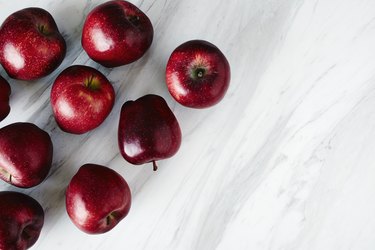
The hot sauce you add to your eggs and chili did not cause your ulcer, but continuing to add it may not make you feel any better. Gastric ulcers are caused by bacteria known as Helicobacter pylori. Diet may not be responsible for the painful stomach sores. However, eating a balanced and healthy diet and avoiding foods that irritate your ulcer may help prevent flareups and pain. If any food irritates your ulcer, avoid it in your ulcer diet, even if it's considered a nonirritating food.
Tip
Although diet might not be the cause of a gastric ulcer, choosing ulcer-friendly foods will help you heal and prevent additional flareups.
Video of the Day
Ulcer-Friendly Foods
Nutrient-rich fruits and vegetables make good snacks for ulcer patients when trying to limit ulcer pain. Include a variety in your ulcer diet throughout the week, especially green and orange vegetables such as broccoli, spinach, carrots and sweet potatoes, to up your nutrient intake. The flavonoids found in apples, cranberries, cranberry juice, onions and celery may help inhibit the growth of the H. pylori bacteria.
Video of the Day
A study published in February 2019 in the Journal of Clinical Medicine found that certain isolated flavonoids may be used as an alternative or supplemental treatment for an H. pylori infection. Additionally, the fiber in fruits and vegetables may help speed up ulcer healing.
Go With Whole Grains
Grains, such as bread, rice and pasta, may also be well-tolerated by those dealing with a gastric ulcer. Make at least half your grain choices whole grain to increase your fiber intake and help with the healing. In addition to fiber, whole grains are also a good source of essential micronutrients you need for overall good health such as B vitamins, magnesium, iron and selenium. Examples of whole grains include whole-wheat bread, brown rice, oatmeal and millet.
Keep Your Dairy Low Fat
Foods high in fat may cause discomfort and should be avoided when you have an ulcer, so include dairy foods that are low in fat. Good choices include low-fat or nonfat milk, yogurt or cheese, buttermilk, low-fat ice cream or sherbet. If you do not tolerate dairy foods, soy milk may be an option for you. Milk does not coat the stomach to relieve pain, so it is not necessary to drink large amounts, according to MedlinePlus.
Choose Lean Sources of Protein
Also include protein foods that are low in fat to limit gastric irritation. Poultry, seafood, lean red meat such as pork chops or strip steak, beans and tofu make healthy choices. Nuts, nut butter and seeds are a healthy source of protein but are higher in fat than other sources, so you may need to take some precaution when including them in your diet.
In addition to fat, you'll also want to limit your intake of spicy foods and chocolate to reduce stomach acid production and ulcer pain and irritation. Caffeine found in drinks such as coffee and soda should also be limited, as well as alcohol. You should also avoid late-night snacking.
Additional Diet Tips
Note that some meals and snacks for ulcer patients may be well-tolerated by some while worsening symptoms for others. If a particular food seems to irritate your stomach, try eliminating it from your ulcer diet to see if symptoms improve. You can also try eating smaller, more frequent meals to ease digestion. In addition, ask your doctor whether you need to avoid non-steroidal anti-inflammatory drugs (NSAIDs) such as ibuprofen and naproxen, which increase ulcer risk.
To avoid irritating your ulcer, try a sample one-day meal plan of ulcer-friendly foods and snacks for ulcer patients:
- Breakfast — 1 cup of whole grain, low-sugar cereal, one poached or boiled egg, 1 cup of low-fat milk, a banana and caffeine-free tea
- Snack — Six to 12 whole grain crackers, 1 ounce mozzarella cheese
- Lunch — 2 ounces baked chicken, spinach and mustard in a whole-grain tortilla, a pear, and water or caffeine-free tea
- Snack — 1 to 2 tablespoons of peanut or almond butter, one apple
- Dinner — 4 to 6 ounces baked salmon, one medium sweet potato or 1 cup brown rice, steamed green beans, 1 cup fresh fruit, water or 1 cup low-fat milk
- MedlinePlus: "Peptic Ulcer Disease"
- ChooseMyPlate.gov: "Grains"
- ChooseMyPlate.gov: "Protein Foods: What Foods Are in the Protein Foods Group?"
- Harvard Health Publishing: "Peptic Ulcer"
- Ohio State University Wexner Medical Center: "Avoiding Gastric Stimulants"
- National Center for Biotechnology Information: "Peptic Ulcer Disease: A Brief Review of Conventional Therapy and Herbal Treatment Options"